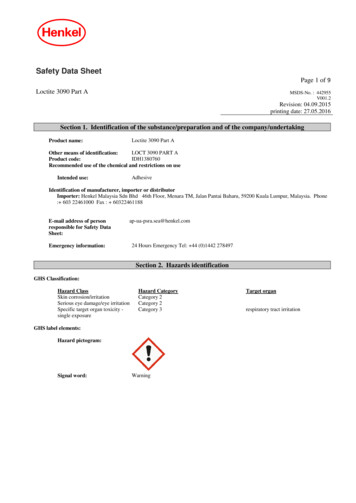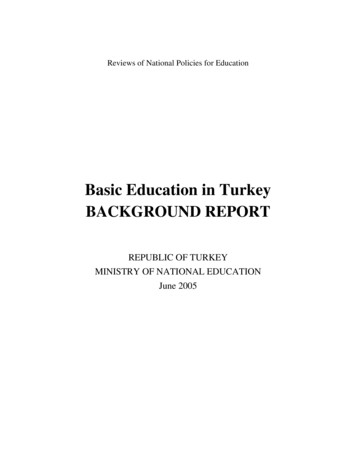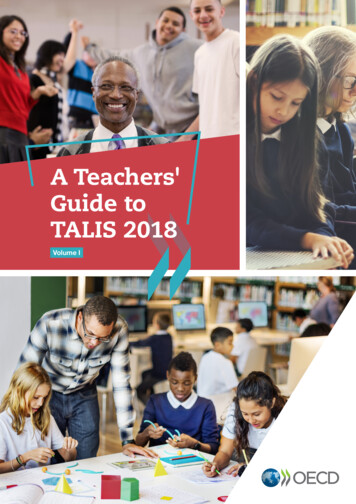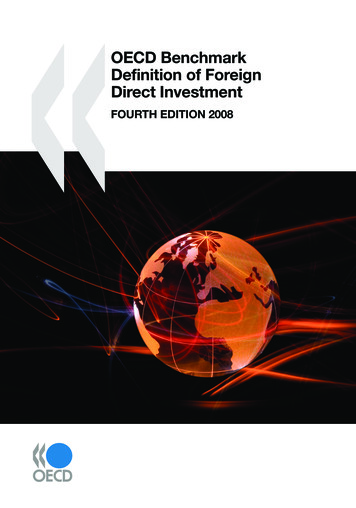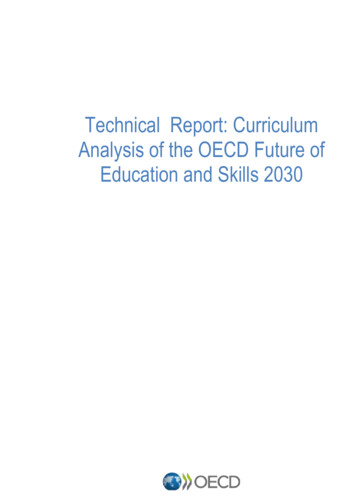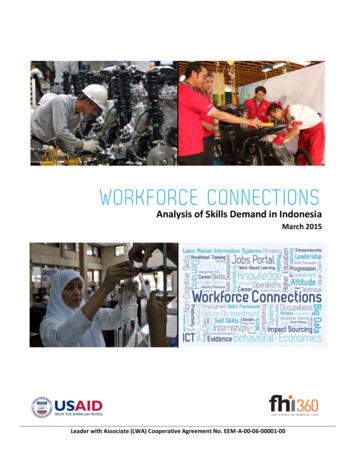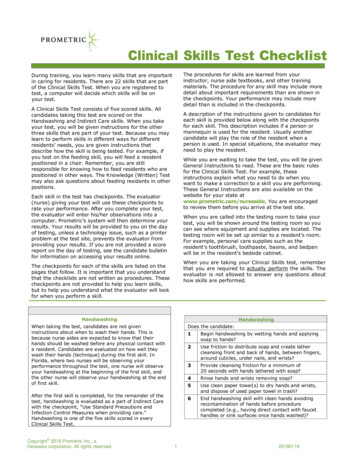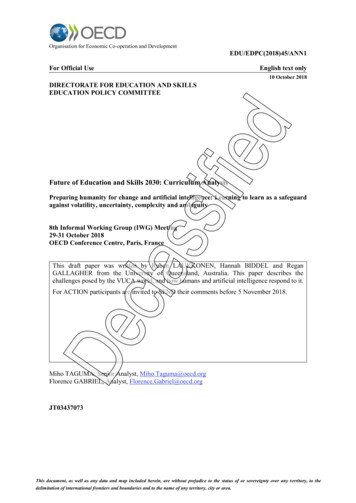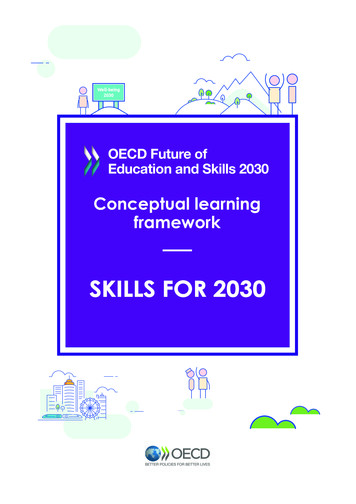
Transcription
Well-being2030OECD Future ofEducation and Skills 2030Conceptual learningframeworkSKILLS FOR 2030
IN BRIEFSKILLS FOR 2030Skills are the ability and capacity to carryout processes and be able to use one’sknowledge in a responsible way to achievea goal. Skills are part of a holistic conceptof competency, involving the mobilisationof knowledge, skills, attitudes and values tomeet complex demands. The OECD LearningCompass 2030 distinguishes between threedifferent types of skills: cognitive and metacognitive skills; social and emotional skills;Social and emotionalskills, such as empathyand respect for others,are becoming essential asclassrooms and workplacesbecome more diverse.and physical and practical skills.As trends such as globalisation and advancesin artificial intelligence change the demandsof the labour market and the skills needed forworkers to succeed, people need to rely evenmore on their uniquely (so far) human capacityfor creativity, responsibility and the ability to“learn to learn” throughout their life.Social and emotional skills, such as empathy,self-awareness, respect for others and theability to communicate, are becoming essentialas classrooms and workplaces become moreethnically, culturally and linguistically diverse.Achievement at school also depends on anumber of social and emotional skills, such asperseverance, efficacy, responsibility, curiosityKEY POINTS As computer technologies have displacedlabour in routine tasks, they have alsocreated new employment opportunitiesfor workers with non-routine cognitiveskills, such as creativity, and social andemotional skills. To remain competitive, workers will needto acquire new skills continually, whichrequires flexibility, a positive attitudetowards lifelong learning and curiosity. Social and emotional skills can be equallyand emotional stability.Physical and practical skills are not only– and in some cases even more – asassociated with daily manual tasks, such asimportant as cognitive skills in becoming afeeding and clothing oneself, but also with theresponsible citizen.arts. To date, researchers have been unableto identify a comparable activity that developsthe cognitive capacity of children in the sameways or to the same extent as music and artseducation does. Engaging with the arts alsohelps students develop empathic intelligence,which enhances their emotional engagement,commitment and persistence.Turn this pageforean interactievexperiencFor the full concept note, click here.More content at: www.oecd.org/education/2030-project
SOCIAL AND EMOTIONAL SKILLSLEARNING TO LEARNProf. Dr. Ingrid SCHOON, Human Development and SocialPolicy, The Institute of Education, University of London, UKLearning to Learn, India, Interdisciplinary learningSource: sSource: sOECD LEARNING COMPASS 20301. DOWNLOADthe free SnapPressmobile lemmasCom22. SCANthis page aluewvnespreingTakntioipaticAnonsibilitypeteenci sAttitudesCreatingCo-agency with peers,teachers, parents,communitiessenciepetmcoeonsatind3. DISCOVERinteractivecontentStudent arning
4 Skills for 2030As defined by the international group of stakeholders involved in the OECD Future ofEducation and Skills 2030 project, skills are the ability and capacity to carry out processesand to be able to use one’s knowledge in a responsible way to achieve a goal. Skills arepart of a holistic concept of competency, involving the mobilisation of knowledge, skills,attitudes and values to meet complex demands.The OECD Learning Compass 2030 distinguishes between three different types of skills(OECD, 2018[1]): cognitive and meta-cognitive skills, which include critical thinking, creativethinking, learning-to-learn and self-regulation social and emotional skills, which include empathy, self-efficacy, responsibilityand collaboration practical and physical skills, which include using new information andcommunication technology devicesCognitive skills are a set of thinking strategies that enable the use of language, numbers,reasoning and acquired knowledge. They comprise verbal, nonverbal and higher-orderthinking skills. Metacognitive skills include learning-to-learn skills and the ability torecognise one’s knowledge, skills, attitudes and values (OECD, 2018[1]).Social and emotional skills are a set of individual capacities that can be manifested inconsistent patterns of thoughts, feelings and behaviours that enable people to developthemselves, cultivate their relationships at home, school, work and in the community, andexercise their civic responsibilities (OECD, 2018[1]; OECD, n.d[2]).Physical skills are a set of abilities to use physical tools, operations and functions.They include manual skills, such as the ability to use information and communicationtechnology devices and new machines, play musical instruments, craft artworks, playsports; life skills, such as the ability to dress oneself, prepare food and drink, keep oneselfclean; and the ability to mobilise one’s capacities, including strength, muscular flexibilityand stamina (OECD, 2018[1]; OECD, 2016[3]). Practical skills are those required to use andmanipulate materials, tools, equipment and artefacts to achieve particular outcomes(OECD, 2016[3]).Cognitive skills, such as creative thinking and self-regulation, and social skills, such astaking responsibility, require the capacity to consider the consequences of one’s actions,evaluate risk and reward, and accept accountability for the products of one’s work. Thissuggests moral and intellectual maturity, with which a person reflects upon and evaluateshis or her actions in light of his or her experiences, personal and societal goals, what heor she has been taught and told, and what is right or wrong (OECD, 2018[1]). While gooddecision making and ethical judgement are encompassed in the concept of skills, thesecompetencies are addressed in the concept note on Attitudes and Values.OECD Future of Education and Skills 2030 Concept Note OECD 2019
5The transfer of knowledge and skills takes place in social contextsThe concept notes on Knowledge and on Attitudes and Values mention that knowledge,skills, and attitudes and values are not competing competencies but rather are developedinterdependently. The acquisition of knowledge requires certain cognitive skills. Thoseskills and relevant content knowledge are not only intertwined, they also reinforce eachother. In addition, attitudes and values are integral to developing knowledge and skills – asmotivation for acquiring and using knowledge and skills, and in framing the definitions ofwhat constitutes “well-being”, good personhood and citizenship (Haste, 2018[4]).The transfer of knowledge and skills from one situation to another takes place in socialcontexts. Abuzour, Lewis and Tully (2018[5]) completed a study that supports this socialfoundation of transfer. They find that, first, students must have sufficient basic knowledgeto be able to transfer skills. Then, support from colleagues and adherence to guidelineshelps students transfer their skills from the classroom to the workplace. Reinforcement is animportant component of transfer as, without it, students and employees may perceive thatthe transfer is not valued and thus not bother to apply learned skills in new contexts(Benander, 2018[6]). Educators can help beginners apply routine skills, such as informationprocessing, in a range of unfamiliar and loosely defined situations. That will help learnerspractice applying their knowledge and skills in different ways.Some research has been conducted on the transfer of knowledge and skills through formatssuch as play (DeKorver, Choi and Towns, 2017[7]) and project-based learning (Lee andTsai, 2004[8]). Considerably more research has focused on the cognitive and metacognitivetransfer between languages. For example, Baker, Basaraba and Polanco (2016[9]) reviewthe literature on student learning in bilingual education. They find that bilingual languageinstruction helped students perform better in reading skills in both languages, although theyreport that there are few studies on writing skills and bilingual programmes.See Ciechanowski (2014[10]), Martinez-Alvarez, Bannan, and Peters-Burton (2012[11]),Keung and Ho (2009[12]) for other studies.Cognitive skills are essential; metacognitive skills are becoming soCreativity and critical thinking are needed to find solutions to complexproblemsTechnology influences how we think about human intelligence and the demand for thetypes and level of skills needed for the future. Over recent decades, computer-controlledequipment has replaced workers in a wide range of jobs that consist of routine tasks – tasksthat follow well-defined procedures that can easily be expressed in computer code. Mostroutine work, such as repetitive calculating, typing or sorting, and production tasks thatrevolve around performing repetitive motions, have been automated since the early 1980s(Figure 1). At around the same time, the demand for non-routine interpersonal andanalytical skills increased dramatically. The explanation is straightforward: as computertechnologies have displaced labour in routine tasks, they have also created newemployment opportunities for workers with non-routine cognitive skills, such as creativity,and social and emotional skills (Berger and Frey, 2015[13]; Bialik and Fadel, 2018[14]).Non-routine manual jobs at first declined in number then plateaued at a baseline level, anindication that there remains some demand for the products and services these jobs provide.OECD Future of Education and Skills 2030 Concept Note OECD 2019
6 Figure 1. Changing prevalence of types of tasks required for work over timeNote: This figure shows how the task composition performed by US workers changed between 1960 and 2009.Source: Autor and Price (2013) in Bialik and Fadel (2018[14]), p.7, CR Knowledge FINAL January 2018.pdf.Artificial intelligence (AI) is adding depth and scale to the challenges posed by technology.Societies will need to determine what is wanted from human intelligence, how best humanintelligence can work with AI, how human and artificial intelligence can complement eachother and, as a consequence, what new knowledge and skills must be acquired andcultivated. By creating AI systems that are able to learn in increasingly sophisticated ways,human intelligence also becomes more sophisticated (Luckin and Issroff, 2018[15]).Compared with other technologies, AI has an unprecedented range of applications that canonly be maximised through the creativity and imagination of the users and designers of AI.This malleability is a major advantage for AI, robotics and big data; but the benefits ofthese technologies can be reaped only if they are put to the service of original, visionaryideas developed by humans (Berkowitz and Miller, 2018[16]). These advances willprofoundly affect the demand for skills by 2030 (Berger and Frey, 2015[13]). According tosome researchers (Avvisati, Jacotin and Vincent-Lancrin, 2013[17]), the skill that mostclearly distinguishes innovators from non-innovators is creativity – more specifically,the ability to “come up with new ideas and solutions” and the “willingness to questionideas”.AI appears less likely to replace jobs that require creativity. Workers in jobs that requireoriginality – “the ability to come up with unusual or clever ideas about a given topic orsituation, or to develop creative ways to solve a problem” – are substantially less likely tosee themselves replaced by computer-controlled equipment, reflecting the currentlimitations of automation. Art directors, fashion designers and microbiologists are thusunlikely to be out of work anytime soon. In other words, although computers are makinginroads into many domains, they are unlikely to replace workers whose jobs involve thecreation of new ideas. Thus, in order to adapt to current trends in technology, many workersand future learners will need to acquire creative skills (Berger and Frey, 2015[13]).OECD Future of Education and Skills 2030 Concept Note OECD 2019
7Higher-order skills, such as problem solving, critical thinking, goal setting and decisionmaking, overlap with other domains. Critical thinking includes inductive and deductivereasoning, making correct analyses, inferences and evaluations (Facione et al., 1995[18]).Components of cognitive skills are interwoven with social and emotional skills so closelythat it is difficult to tease apart and attribute the acquisition of these skills to one categoryor another. For instance, critical thinking involves questioning and evaluating ideas andsolutions. This definition encompasses components of metacognition, social and emotionalskills (reflection and evaluation within a cultural context), and even attitudes and values(moral judgement and integration with one’s own goals and values), depending on thecontext. Critical thinking skills are also significantly affected by both traditional schoolexperiences and by life experiences outside the classroom (OECD, 2016[3]).Citizens with critical thinking skills are also more likely to be self-sufficient and, thus,less dependent on the state’s social spending (Facione, 1998[19]). They are more likely tobe equipped to give back to society, for example through social entrepreneurship andprosocial behaviours (Peredo and McLean, 2006[20]). Critical thinking skills are seen asnecessary to enter the workforce. Critics of the quality of higher education frequently citethe proportion of recent college graduates who are ill-prepared to enter the workforce anddeficient in critical thinking skills (Flores et al., 2012[21]; OECD, 2016[3]).Metacognition, lifelong learning and understanding other cultures are neededto adapt to a changing environmentMetacognition refers to the skills of “thinking about thinking”. Metacognition can beunderstood as “non-routine analytical skills” in which awareness of one’s own learning andthought processes leads to the intentional application of specific learning techniques todifferent situations (Bialik and Fadel, 2018[14]; Berger and Frey, 2015[13]). Learningstrategies, or “learning to learning”, are also widely seen as a key competency for lifelonglearning, and are emphasised as a goal for education in many European countries (Kikasand Jõgi, 2016[22]).Metacognitive skills are vital to education because of their impact on the process of learning(Veenman, Kok and Blöte, 2005[23]). For instance, metacognition significantly predictscritical thinking, a key component of learning (Magno, 2010[24]). Components ofmetacognition become increasingly important as children enter secondary school, wherereasoning, regulation and reflection become more integral to the curriculum.A proliferation of mindfulness-based interventions in schools specifically targets theseskills. Preliminary findings show that these interventions can reduce stress and anxiety,increase optimism, help improve social and cognitive skills, and raise academicachievement (Schonert-Reichl et al., 2015[25]; Schonert-Reichl and Lawlor, 2010[26];Beauchemin, Hutchins and Patterson, 2008[27]).As trends such as globalisation and advances in artificial intelligence change the demandsof the labour market and the skills needed for workers to succeed, people need to rely evenmore on their ability to “learn to learn” throughout their life. The OECD Skills Outlook2017 (OECD, 2017[28]) reports that “workers’ cognitive skills and readiness to learn play afundamental role in international integration, as workers need them to share and assimilatenew knowledge, allowing countries to participate and grow in evolving markets”.Given the hyper connectivity of today’s – and tomorrow’s – world, another key area ofcognitive development is the knowledge and understanding of other cultures.Some developmental scientists (Eccles and Gootman, 2002[29]) identify in-depthknowledge of more than one culture as crucial to cognitive development, particularly asyoung people mature.OECD Future of Education and Skills 2030 Concept Note OECD 2019
8 Humans are likely to be able to handle uncertainty better than AIHumans can cope with uncertainty through their actions, by developing their beliefs andunderstanding of what is happening in the world, and through their ability to discard beliefswhen they are inaccurate or damaging. In other words, humans navigate throughuncertainty by being adaptable learners. When placed in a novel circumstance – such asa new country, new school or new workplace – people learn the new structure in theenvironment and adapt or replace old structures or beliefs that are no longer relevant.Machines are not (yet) able to respond to uncertainty. AI can complete specific tasksefficiently, and respond effectively to complexity and to some characteristics ofuncertainty, but if the goals and context of the task are ambiguous or change, thena “breakdown” often occurs. Put simply, humans possess the capacities to deal withvolatility, uncertainty, complexity and ambiguity but sometimes fail to do so productively,while, in many cases, machines lack those capacities entirely (Laukkonen, Biddell andGallagher, 2018[30]).Students’ digital skills need to evolve with technological developmentsAs digital technologies are adopted in the workplace, acquiring and maintaining a set ofdigital skills is becoming increasingly important for the vast majority of workers.The OECD also foresees employment in ICT industries increasing as advances in “smartgrid” technology reshapes the management of energy systems, infrastructure andtransportation. According to the European Commission, the demand for workers withspecialist digital skills is already growing by about 4% each year (Berger and Frey,2015[13]).As the workplace continues to undergo substantial restructuring in response to newtechnologies, many digital skills will rapidly become outdated. For example, coding skillstend to become obsolete in only a few years’ time. According to a study by the EuropeanCentre for the Development of Vocational Training, 16% of workers in Finland, Germany,Hungary and the Netherlands saw their skills become obsolete over the previous two years;digital and ICT-related skills were identified as particularly vulnerable to rapidobsolescence (Cedefop, 2012[31]).Thus, to remain competitive, workers will need to acquire new skills continually, whichrequires flexibility, a positive attitude towards lifelong learning and curiosity.While ICT specialists will be needed, a combination of skillsets that makes workersadaptable to technological change will be even more important. Therefore, educationshould focus on imparting “fusion skills” – the combination of creative, entrepreneurial andtechnical skills that enable workers to shift into new occupations as they emerge (Bergerand Frey, 2015[13]). Box 1 (next page) provides an overview of new and emerging jobs.OECD Future of Education and Skills 2030 Concept Note OECD 2019
9Box 1. Examples of new and emerging jobsOccupationDescriptionExamples of skillsRoboticsengineersResearch, design, develop or test roboticapplicationsBiostatisticiansDevelop and apply biostatistical theory andmethods to the study of life sciencesFuel-cellengineersDesign, evaluate, modify or construct fuelcell components or systems fortransportation, stationary or portableapplicationsContact new or existing customers todetermine their solar equipment needs,suggest systems or equipment or estimatecostsCritical thinking,complex problemsolving, qualitycontrol analysisInductive reasoning,oral expression,mathematicalreasoningJudgement anddecision making,writing, criticalthinkingActive listening,persuasion, socialperceptivenessSolar salesrepresentativesand assessorsVideo gamedesignersDesign core features of video games; specifyinnovative game and role-play mechanics,story lines, and character biographies; createand maintain design documentation; guideand collaborate with production staff toproduce games as designedProgramming,critical thinking,complex problemsolvingExamples ofknowledgeEngineering andtechnology, robotics,designExample of attitudesand , Englishlanguage, educationand isitivenessFocus, reliability,feedbackPhysics, mathematics,chemistrySales and marketing,engineering andtechnology, customerand personal serviceAccountability, focus,results orientationDesign,communications andmedia, psychologyInquisitiveness,playfulness, passionSource: O*NET (www.onetonline.org) in (Berger and Frey, 2015[13])Social and emotional skills are increasingly recognised as essentialWorkers whose jobs require social and emotional skills are unlikely to bereplaced by technologyAs discussed above, AI is unlikely to replace workers whose jobs require creativity;similarly, AI is unlikely to replace workers who jobs require complex social interactions.Thus, in order to adapt to advances in technology, workers will also have to acquire socialskills, including persuasion and negotiation (Berger and Frey, 2015[13]).There is a danger that the increasing reliance on sophisticated machines will lead somepeople to devalue others; some scholars (Turkle, 2017[32]) are convinced this devaluationis already occurring. If these scholars are right, then it will be increasingly important forpeople to learn how to recognise the value of their own humanity, and that of others(Putnam, 2000[33]). Valuing the contributions that people make to society is necessary notonly for individual and societal well-being, but also for the health and relevance ofinstitutions (Berkowitz and Miller, 2018[16]).Demographic and societal changes demand more social and emotional skillsAs populations age, the demand for healthcare will continue to rise. This is reflected in thewide range of new and emerging healthcare-related occupations, which require bothscientific skills, and social and emotional skills, such as caring, sociability and respect.For example, acute care nurses and hospital staff require a high degree of socialperceptiveness to understand emotional patterns and interact with patients (Berger andFrey, 2015[13]).OECD Future of Education and Skills 2030 Concept Note OECD 2019
10 In addition, social and emotional skills, such as empathy, self-awareness, respect for othersand the ability to communicate, are becoming essential as classrooms and workplacesbecome more ethnically, culturally and linguistically diverse. To acknowledge and respondto these global connections, education may promote certain social and emotional skills thatare considered to be related to cognitive skills. For example, social emotional skills suchas “empathy” would require cognitive skills such as “perspective-taking”. Education mayalso foster the types of attitudes and values, such as openness and respect for others asindividuals, that students need in order to be more inclusive and reflective of more diversesocieties. In this context, this particular set of skills has come to be known as globalcompetence (OECD, 2018[34]).Social and emotional skills improve academic and labour market prospectsAchievement at school depends on a number of social and emotional skills, such asperseverance, self-control, responsibility, curiosity and emotional stability. Some socialand emotional skills are a prerequisite for successful participation and performance inacademic settings. In other words, poor social and emotional skills can impede the use ofcognitive skills. For example, studies that investigated the relationships between social andemotional indicators and years of schooling show that conscientiousness and openness toexperience is a good predictor of how many years students will spend in school (OECD,n.d[2]).1Another study (Heckman and Kautz, 2012[35]) finds evidence of the relationship betweenpersonality and cognitive skills in results from the General Education Development (GED)programme. The GED allows high-school dropouts to earn a high-school diploma bypassing an academic performance test. The study finds that GED graduates who haddropped out of high school and later passed the GED test to earn a high-school diplomahave similar levels of cognitive skills as regular high-school graduates, but poorer socialand emotional skills (OECD, n.d[2]).While cognitive skills have also long been considered the most important determinants ofsuccess in employment, recent studies show that social and emotional skills also directlyaffect occupational status and income. In fact, social and emotional skills can beequally – and in some cases even more – important as cognitive skills in determining futureemployment (OECD, n.d[2]).Practical and physical skills help students develop other types of skillsDeveloping physical skills through music and arts can help promote cognitiveand metacognitive skillsMusic and the arts are learned physically. To both understand and demonstrate learning inthe arts, children must experience them. To date, researchers have been unable to identifya comparable activity that develops the cognitive capacity of children in the same ways orto the same extent as music and arts education does. In undertaking the acquisition ofphysical skills in the arts, significant cognitive and metacognitive processes must takeplace. While the arts are expressed through physical skills, mastery of the arts requirescognitive and metacognitive processes too (OECD, 2016[3]).The effects of including high-quality, meaningful and ongoing arts education in children’seducation experience has been researched extensively (Winner, Goldstein and VincentLancrin, 2013[36]). The Dana Consortium (Asbury and Rich, 2008[37]) conducted a metaanalysis of arts research in the area of intelligence and found that engagement in artsOECD Future of Education and Skills 2030 Concept Note OECD 2019
11activities improves a child’s attention, which, in turn, can improve their cognition (Posnerand Patoine, 2010[38]). Engagement with the arts develops students’ empathic intelligence(Davis, 2008[39]), which enhances their connectivity, emotional engagement, and sense ofidentification with and responsibility for others. Studying and producing visual arts enablesstudents to engage, persist, commit to a project and follow through with a task (Hetlandet al., 2007[40]). These skills, used in conjunction with divergent thinking, are rarelydeveloped elsewhere in the school curriculum. Hetland et al. also find that the arts teachstudents to “envision”, that is, think about that which they can’t see. These skills aretransferable to other areas, such as developing hypotheses or imagining past events orpredicting future ones. The intelligences developed through the arts have positive impactson external measures of students’ success too. For example, Walker, Tabone and Weltsek’s(2011[41]) study in the United States finds that students who received an integrated artscurriculum were 77% more likely to pass their state assessment (OECD, 2016[3]).Physical and practical skills are essential for students’ overall functioning andwell-beingPractical skills are often associated with manual dexterity and craftwork. Yet, practicalskills have a far wider range of applications. For instance, many daily functions, such asgetting dressed, keeping clean, preparing food, engaging in written work or usingtechnologies of any kind, require practical skills. For example, the use of smartphones andcommunicating by text presumes mastery of a set of practical skills that allow the user tocreate messages and send them using a small keypad (OECD, 2016[3]).Student health and well-being is a global priority. Physical education can help studentsdevelop healthy habits and acquire knowledge about health. Research increasingly showsthat the habits established in youth carry over into adulthood, so establishing healthy habitsearly helps young people make healthy choices as adults.Over the past few decades, research has revealed the benefits of exercise on children’sphysical and mental health, cognition and academic achievement. Longitudinal researchshows that the development of fundamental motor skills at preschool age predicts cognitiveefficiency and academic achievement (Roebers et al., 2014[42]) when children transition toschool (van der Fels et al., 2015[43]). Recent research links motor co-ordination and skillscompetence to cognitive efficiency and academic achievement in children (Haapala,2012[44]; Haapala et al., 2014[45]; Rigoli et al., 2012[46]) and adolescents (Marchetti et al.,2015[47]; Rigoli et al., 2012[48]). These associations are consistent with neurodevelopmentalresearch that reveals linkages among brain structures involved in controlled motor actionsand executive functions (Diamond, 2012[49]). Another review provides additional supportfor the inter-relationship between physical activity and motor-skill proficiency, on the onehand, and children’s cognitive function and academic achievement on the other (Vazouet al., 2016[50]).OECD Future of Education and Skills 2030 Concept Note OECD 2019
12 ReferencesAbuzour, A., P. Lewis and M. Tully (2018), “Practice makes perfect: A systematic review of theexpertise development of pharmacist and nurse independent prescribers in the UnitedKingdom”, Research in Social and Administrative Pharmacy, Vol. 14/1, pp. 02.002.[5]Asbury, C. and B. Rich (eds.) (2008), Learning, Arts and the Brain: The Dana ConsortiumReport on Arts and Cognition, Dana Press, g-arts-and-brain-dana-press.pdf.[37]Avvisati, F., G. Jacotin and S. Vincent-Lancrin (2013), “Edu
Cognitive skills are a set of thinking strategies that enable the use of language, numbers, reasoning and acquired knowledge. They comprise verbal, nonverbal and higher-order thinking skills. Metacognitive skills include learning-to-learn skills and the ability to recognise one’s knowledge, skills



